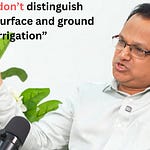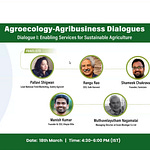If you’ve been playing the long game in agriculture, you would know that you can never hermetically seal off politics from agriculture.
Although technocrats of my ilk love to fantasize about depoliticizing the domains of food and agriculture through data, the reality is that politics always dictates how data is collected and used. Algorithms, whether they strive to weed out leakages in welfare schemes in India, or decide how to allocate power and money through the census data in the US, are, at the end of the day, political creatures.
“Politics and algorithms are more entwined than most people realize. Politics are made of algorithmic systems and algorithmic systems are made of politics.”
Why does politics remain an albatross around the neck of agriculture?
When does support hobble farmers and when does it help farmers? How do we navigate policymaking waters when farmers increasingly start to wear, paradoxically, the hat of consumers? Why do governments across the world worry about inflation? Why is farm-gate-price-driven demand agriculture as a tool for reducing poverty a manufactured myth?
To explore these questions and unpack the terranean forces that underpin agricultural technology adoption, I went down the rabbit hole of politics with Ajay Vir Jakhar, chairman of Bharat Krishak Samaj (Indian Farmers Forum).
“Jakhar, comes with a formidable political lineage. He is the grandson of Balram Jakhar, who was agriculture minister in [former prime minister of India] PV Narasimha Rao’s cabinet. His father, now retired, was in politics and his uncle was, till Thursday, leader of the Opposition in the Punjab Assembly-” (From Ajay Vir Jakhar’s Interview in Business Standard)
I’ve found Ajay’s irreverent candor a breath of fresh air. Despite championing the cause of farmers, his perspectives often point towards the elephant in the room and raise questions no one is willing to talk about.
Amidst voices clamouring to make us feel sorry for farmers in the name of supporting farmers, he walks the middle path of bringing policy reforms without losing sight of the fundamental issues that plague Indian agriculture.
When was the last time someone argued persuasively enough to change your mind?
If you’ve been reading Agribusiness Matters, you would know my inclination towards taxing agricultural income in India.
When I met him at a panel in New Delhi in October last year, we started debating about the feasibility of taxing agricultural income in India and we continued that conversation in this podcast as well.
In this fascinating conversation, we explored
What is the idea behind Bharat Krishak Samaj? How to understand the role of Farmer advocacy organizations vis-a-vis farmer unions?
Why does politics remain an albatross around the neck of Agriculture?
Why do farmers not have much say on the policies that affect them despite being a majority vote bank? How to understand this contradiction in a global context where farmers, say, in the US have a bigger say on policies than Indian farmers?
Why is decontextualized policymaking a bane for Indian Agriculture?
What is the difficulty of taxing agricultural income in India? [Ajay shared an interesting anecdote based on his interactions with the late Indian finance minister Arun Jaitley]
According to Ajay, what would ideal farm reforms look like?
Why should governments focus on human resources instead of infrastructure?
Why we should document failures in Indian Agriculture? Why is it wrong to assume that fertilizer subsidies are helping farmers?
What policy changes could steer Indian Agriculture towards an agroecological paradigm and create alternative markets and marketplaces?
How does Ajay see the clash of paradigms between the Industrial agriculture paradigm and the agroecology paradigm? Is there a clash of paradigms in the first place? How can we build markets and value chains that value the quality of the produce? How can we change the design of the market?
Why do Indian farmers not prefer to have cows these days? How has the Indian political party BJP supported natural farming paradigms?
I hope you enjoy the conversation:)
So, what do you think?
How happy are you with today’s edition? I would love to get your candid feedback. Your feedback will be anonymous. Two questions. 1 Minute. Thanks.🙏
💗 If you like “Agribusiness Matters”, please click on Like at the bottom and share it with your friend.












